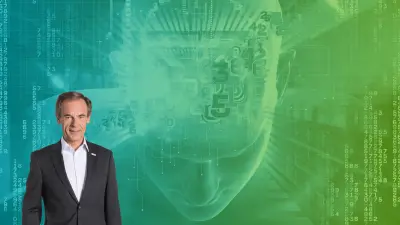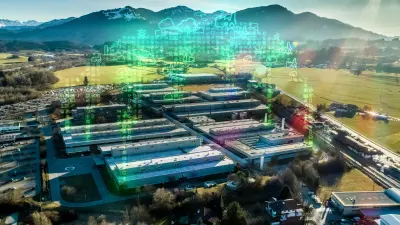Values can drive innovation
How entrepreneurial responsibility also opens up technological perspectives

2020-10-21
Good companies are not just about value; they also have values. And these values, whether responsibility or trust, have not just proved their worth in the past, but can also point the way into the technological future.
by Dr. Volkmar Denner
The fast track to the rapid test for Covid-19
It is no coincidence that more and more innovation-driven companies are following a clearly defined values compass. Not least, the Covid-19 crisis has demonstrated the inspirational power of such a compass. Within a few weeks, companies rearranged their manufacturing operations and supply chains. And, on the basis of the Vivalytics platform it had created in a long development process, Bosch launched a rapid test for Covid-19. Some might say that inventiveness like this was motivated by purely business interests and the desire to stay ahead of the competition. But far from it. Of course, even a technology company has to earn the money it spends on research. But the more meaningful the objective, the greater associates’ commitment will be. Values are not just about tradition. They can also be a driver of innovation.

“The more meaningful the objective, the greater associates’ commitment will be.”
Between profitability and sustainability
That said, values-driven companies need to have especially thick skins, and be able to take tensions in their stride — tensions between legal liberties and ethical self-restraint in business practice, between profitability and sustainability, and not least between people and machines. In this context, it is not problem solving that is the primary management task, but increasingly the resolution of dilemmas. Nothing illustrates this better than the three poles — economy, ecology, and society — that entrepreneurial responsibility has to reconcile. Especially in times of crisis and change, company leadership is a demanding and never-ending balancing act. The companies that navigate this successfully will create lasting value. This at least is what a number of recent analyses suggest — companies that act sustainably have held up better on the stock markets than others, also when faced with coronavirus. But sustainability is not possible without innovativeness and values to guide us.
15,000 lives saved
through ESP® after a quarter of a century (alone in Europe).
ESP® — when technology becomes a guardian angel

This was a principle that Robert Bosch made his own. As he once said, technology has to be designed “to help the whole of mankind make the best of their lives and find happiness in life.” For present-day tastes, the idea of technological progress as a panacea for the world’s ills may seem slightly overblown. Our current principles for product development are more sober in tone, and demand that any product must safeguard human life to the greatest possible extent, and that impact on the environment and resources be kept to a minimum. The Bosch “Invented for life” ethos is formulated precisely in this spirit. For our engineers, it is an imperative. The most outstanding example of this just turned 25 — the ESP® electronic stability program. After a quarter of a century, it can look back on 15,000 lives saved and 450,000 accidents prevented, and this in Europe alone. Sometimes, technology can be a kind of guardian angel.
Technological impact needs a technological response
For a technology company, it makes perfect sense to come up with new, intelligent technology in response to the negative impact of technology — road accidents, for example. However, some of the long-term impacts of industrialization cannot be remedied by an individual feat of innovation. No company whose values code includes sustainability can ignore this. One such long-term impact — which nonetheless has to be tackled here and now — is climate change.
Climate action is shifting the limits to growth
But what can we do about climate change? Instantly and completely abandoning the idea of growth is certainly not the answer. Anyone who proposes this is denying billions of people in developing countries the chance of health, education, and prosperity. Above all, however, the idea that growth has limits implies that there are also limits to technological progress. But the converse is true. It is technological progress that can bring about a green shift in the limits to growth. Energy efficiency, the generation of renewable power, the use of green hydrogen to produce synthetic fuels — all these things can help decarbonize economic growth. And it is precisely these levers that Bosch is moving in order to make its own locations carbon neutral. In the end, it is technology created by inspired and committed people that makes sustainability possible.

No artificial intelligence without ethical checks
However, there is one thing we have to accept. There are technological developments that are not as immediately accessible as the fight against disease, accidents, and climate change. When talk turns to artificial intelligence, for example, many people still have their reservations – including the fear that AI might overtake human intelligence. We may think them wrong, but we have to take them seriously. And precisely for this reason, our work to develop AI has to be not only technologically innovative, but ethically thoughtful as well. Bosch, for example, has drawn up its own principles for the use of artificial intelligence. We do not want intelligent machines to replace human thought, but instead to complement it. Bosch wants to grow with AI, but has imposed ethical checks on AI development. Only when these checks are observed can the trust arise that we believe will be conducive to business over the long term. When an innovation such as artificial intelligence achieves a breakthrough, it will be because of values.


